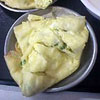Daily Life Q&A
I thought some people might find interesting the answers I gave to some questions my dad asked me recently by e-mail:
> You know, we hear about all the neat times that you have — & we’re glad to hear about them. I’m wondering about the day to day stuff:
Sorry… It’s sometimes hard to think of what day-to-day stuff I haven’t mentioned or what might actually be interesting to you. I’ve lost some of the outsider’s perspective.
I write for my own pleasure as well as my readers’, so I tend to go light on day-to-day stuff.
> What do you have for breakfast?

Hmmm… Maybe this is why I go light on the stuff. A lot of the answers to seemingly simple questions have to be really long because of cultural differences. A lot of the things I eat are Chinese, and not available in the U.S. I sometimes eat rolls or bread, but usually a “roubing” (fried breadish stuff with meat filling in the middle) or a “danbing” (sort of a crepe with egg and chives and sauce). I usually drink milk or juice.
> What’s a typical everyday day like?
Hmmm… I don’t think there’s a “typical” day… I usually have class in the morning. I frequently eat lunch with Wilson and/or Helene or Nicola. I have to plan for class, but only in the beginning of the week. I still study Chinese. I hang out with Wilson quite a bit. Sometimes we watch DVDs at night. I go online, read and answer e-mail quite a bit. I also post new blog entries pretty frequently. Unfortunately, I don’t spend a lot of time with Chinese friends these days. I just don’t feel really close to anyone now.
> Do you eat out most meals?
Yes.
> Do you cook for yourself?
Almost never.
> Do you guys have “pot lucks” in the dorm?
Not yet.
> Is your cooking a la Chinoise or a la Americaine?
It’s really hard to cook a lot of American things here. Examples… You can buy spaghetti, but the sauce is almost impossible to find at most stores in Hangzhou. Furthermore, just asking if they have it is difficult, because it’s not an item that Chinese people are familiar with. All pasta is referred to as “Italian noodles,” and if you translate “tomato sauce” it means “ketchup.”
The Chinese seem to be fond of lumping unfamiliar concepts together and then applying generalizations. Examples: “Foreigners are tall.” “Western food is bland and simple.” Some of the few American things I can make without too much hassle are ham and cheese sandwiches (only processed American cheese, though), tuna salad sandwiches, and egg salad sandwiches. Even those, though, require special (expensive) ingredients: sliced ham, cheese, mayonaise, canned tuna.
Maybe you’ll suggest I try this or try that, but the simple fact is that going shopping, then cooking, then cleaning up is a big hassle for one person. Coordinating groups efforts is also a hassle. When fully prepared Chinese food is so cheap and ubiquitous, it’s the way to go (except on special occasions).
> Do you go to movies?
No, I buy DVDs.
> Do you have a radio?
Yes, but I rarely use it.
> What kind of things can you listen to there?
I buy CDs (Western and Chinese) occasionally, but I mostly listen to MP3s.
> Do you use your computer to play music?
Yes.
> Do you take buses, rickshaws, taxis, private vehicles, or Shank’s Mare to get around?
Yes, no, yes, no, and HUH?
“Rickshaws” as you probably imagine them do not really exist in modern China. They were banned by Mao. Pedicabs (big cargo tricycles) are everywhere, both for human transport as well as all kinds of cargo. I rarely ever use those, though. They’re not a whole lot faster than walking, and I’m way faster on my bike.
> Is public transportation inexpensive?
Yes. 1 or 2 yuan ($0.125 or $0.25). Taxis usually range from 10-30 yuan depending on the destination.
> Do you spend all day at church on Sundays?
No.
> Are you still working w/ the kids at church?
No. One hour a week for kids so young seems to do nothing. They don’t retain anything.




John,
Recently I was in Shanghai staying at Shanghai University for a week. Nearly every morning I enjoyed a ‘danbing’ from a man just around the corner and haven’t stopped thinking of them since. Any chance you’ve got a ‘danbing’ recipe?
Thanks and enjoy your time in China.